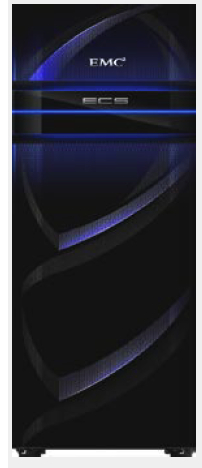Elastic Cloud Storage Appliance
"28% lower TCO" than Amazon in large-scale (11.5PB raw/5.7PB utilized) implementations
This is a Press Release edited by StorageNewsletter.com on May 12, 2014 at 3:07 pmAt EMC World 2014, EMC Corporation announced the its ECS (Elastic Cloud Storage) Appliance (formerly known as ‘Project Nile’), an hyperscale cloud storage infrastructure that redefines the economic benefits of cloud storage for service providers and customers of any size, in any industry.
The 3rd Platform of IT is based on the trends of cloud, mobile, social and big data and is creating a new world of opportunity – and competitive threat – for businesses in every industry. Next-generation applications are delivering unique and frictionless experiences for customers to both interact and transact. This requires a new storage infrastructure to take advantage of analytics from the big data generated by these applications. ECS Appliance is the answer.
The ECS Appliance delivers the ease-of-use and agility of a public cloud with the control and security of a private cloud – offering between 9%-28% lower TCO in object storage implementations than public clouds from Amazon and Google.
It allows customers to add hyperscale cloud capabilities to existing private and hybrid cloud environments, delivering ease-of-use through self-service capabilities, automated provisioning and data services for next-generation applications.
The data driven by use of next-generation applications over mobile devices creates multiple challenges for service providers and customers: it should be accessible, secure and analytic-ready, and the storage infrastructure must be able to handle growth. The appliance is a modular, scale-out solution developed to provide high density per rack unit, with up to 2.9PB in a single rack. It can be clustered to achieve exabyte scale.
Customers who choose to store their data in a public cloud environment often perceive immediate benefits in terms of ease-of-use and ability to scale; however, they may incur other risks such as system outages and the costs of moving their data in and out of the public cloud environment. In many instances they can also run into compliance issues as they may not know where their data is stored, if or how it is backed up, and whether it is being accessed by unauthorized users. The ECS Appliance provides a solution that eliminates these tradeoffs inherent within the public cloud.
Services and Availability
EMC is also introducing new Architecture and Design services for the ECS Appliance. The services will help customers identify which of their current application workloads will drive business return with the appliance, and will architect and design a system configuration to drive maximum impact and value within their environment. The services will be available with the general release of the ECS Appliance in the second quarter of 2014.
Simon Robinson, research VP, 451 Research, said: “Our research tells us that mid-sized to large organizations are increasingly looking to leverage the cost and scale benefits of public cloud models, but on their own terms. With the announcement of the ECS Appliance, EMC is providing an alternative approach that promises to bring hyper-scale efficiencies to on-premise and hybrid cloud deployments. We believe this kind of approach represents the future of enterprise storage infrastructure for cloud-based applications and workloads.”
Amitabh Srivastava, president, EMC advanced software division, said: “With the ECS Appliance we have delivered a highly intelligent, easy-to-manage storage platform based on commodity hardware. It gives customers of any size the ability to build a hyper scale cloud infrastructure with the simplicity and economics of the public cloud and all the security and control of the private cloud. With block, object and HDFS capabilities in one appliance, our customers can easily develop and build the next generation of applications for the 3rd Platform of IT.”
EMC ECS Appliance delivers 9% (Google) and 18% (Amazon) lower TCO in mainstream-sized (1.4PB raw/740TB utilized) customer implementations; 23% (Google) and 28% (Amazon) lower TCO in large-scale (11.5PB raw/5.7PB utilized) customer implementations.















 Subscribe to our free daily newsletter
Subscribe to our free daily newsletter

